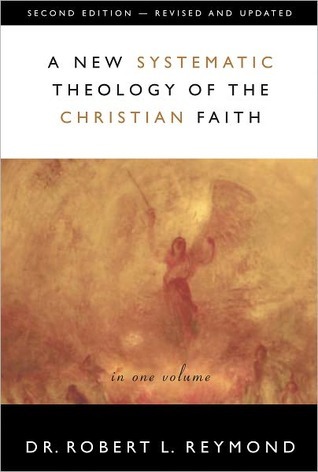Kindle Notes & Highlights
Started reading
February 23, 2014
Covenant Theological Seminary, St. Louis, Mo. and Knox Theological Seminary, Fort Lauderdale, Fla.
Louis Berkhof’s
Charles
Hodge, Benjamin B. Warfield, John Murray, and G. C. Berkouwer.
I refer to the Pelagian, semi-Pelagian, semi-semi-Pelagian, Arminian, apostate, and name-it-and-claim-it “gospels” which abound on every hand. To all these false “gospels” the Reformed faith is the only antidote.
hath chosen, in Christ,
His mere free grace and love,
are redeemed by Christ, are effectually called unto faith in Christ by His Spirit working in due season, are justified, adopted, sanctified, and kept by His power, through faith, unto salvation.
The doctrine of this high mystery of predestination is to be handled with special prudence and care.… (Westminster Confession of Faith, III/iii–vi, viii)
(1) “Acknowledge that you are a sinner and need to be saved,” (2) “Believe that Jesus died on the cross for sinners,” (3) “Ask God to forgive you of your sins,” and (4) “Put your trust in Jesus.” While these are things which the sinner must surely do in order to be saved, they hardly constitute the content of God’s “eternal plan of salvation.” And it is only a debased level of theological awareness, but one quite current in our day, that would suggest that it is.
Warfield
God’s Eternal Purpose
The church of Jesus Christ—the redeemed community—also stands in Jesus Christ at the beginning, the center, and the end of God’s eternal purpose.
“God saved us and called us with a holy calling, not according to our works but according to his own purpose and grace which was given to us in Christ Jesus from all eternity.”
Romans 9:11–13
the grace principle which governs all t...
This highlight has been truncated due to consecutive passage length restrictions.
not according to works but according to him who calls—she
“in order that God’s ‘according to [kata] election purpose’ might stand [that is, might remain immutable],” in terms of the following phrase, “not according to [ek] works but according to [ek] him who calls [unto salvation],”5 which is equivalent to saying “not according to works but according to grace.”
“This one, by the determining purpose [te¯ horismene¯ boule¯] and foreknowledge [progno¯sei] of God, was handed over, [and] you with wicked hands put him to death by nailing him to the cross.” In both Jesus’ and Peter’s statements the church should find indisputable reason for believing that the cross of Christ was central to the eternal plan of God.
hand and your will predestined [proo¯risen] should happen.” And it is possible that it is God’s eternal plan of salvation in and by Christ’s cross work which Hebrews 13:20 intends when it speaks of “the blood of the eternal covenant.”
foreknew [proegno¯—that is, set his heart upon in covenantal love],
(note the pro, prefixes [“before”] attached to the first two verbs) God
Why have we interpreted the first verb “foreknew” (proegno¯) as we have?
the Hebrew verb (ya¯d_a,
(gino¯sko¯,
“to know intimately,”
approximating this meaning rather than the sense of mere
Paul to mean here that God did not set his love upon the elect from all eternity because of foreseen faith or good works,
or perseverance in either of them, or any other condition or cause in them.8
Romans 9:11–13,
2 Timothy 1:9,
In
Ephesians 1:4–5 Paul tells the church that God the Father “chose [exelexato] us in him [Christ] before the creation of the world, that we should be holy and without blame before him, in love having predestinated [proorisas] us unto sonship by adoption through Jesus Christ unto himself, according to the good pleasure of his will.”
2 Thessalonians 2:13 Paul informs his readers—“brothers who have been loved by the Lord”—that “God chose [heilato] you from the beginning [aparche¯n] unto salvation.”
(“self-salvation”)
contends that men can save themselves,
“Augustinianism”
men are incapable of saving themselves and that all the powers essential to the saving of the soul must come from God.
“it was once for all settled that Christianity was to remain a religion, and a religion for sinful men, and not rot down into a mere ethical system,
“Augustinian” in his soteric beliefs.
“By your gift I had come totally not to will what I had willed but to will what you willed”
men and women being born as they are with Pelagian hearts, but rather it only went underground, “meanwhile vexing the Church with modified forms of itself, modified just enough to escape the letter of the Church’s condemnation.”14
The Reformers of the sixteenth century, as we just noted, rejected the synergistic stance of Roman Catholic soteriology16 and returned to the earlier best insights of the later Augustine and to the inspired insights of Paul in his letters to the Romans and the Galatians.
“deification” of the priesthood: “this obviously involves … the subjection of the Holy Spirit in his gracious operations to the control of men … the Holy Spirit is made an instrument which the Church, the means of grace, uses in working salvation.”20
Evangelicalism urges that where the Spirit works, there the church emerges, and also that apart from that church which emerges where the Spirit works there is no salvation.
The Reformed churches contend that if it is God alone who saves (the supernatural confession), and if he saves by the Spirit’s direct and immediate operation by and with the Word upon the soul (the evangelical confession), and if all that he does looking to the salvation of men he does directly to and for all men alike, drawing no distinctions between them (the universalist confession), it seems logical to conclude that all men will be saved.
“The doctrine of the covenants is a peculiarly Reformed doctrine.”
grammatical/historical/biblical hermeneutics,
Calvin makes extensive use of the covenant idea in his Institutes (see, e.g., II.ix–xi), but because he developed his Institutes along Trinitarian lines the covenant concept is not the architectonic or governing principle in that work.4
constitutes the weightiest contribution to Protestant theology since Schleiermacher.


